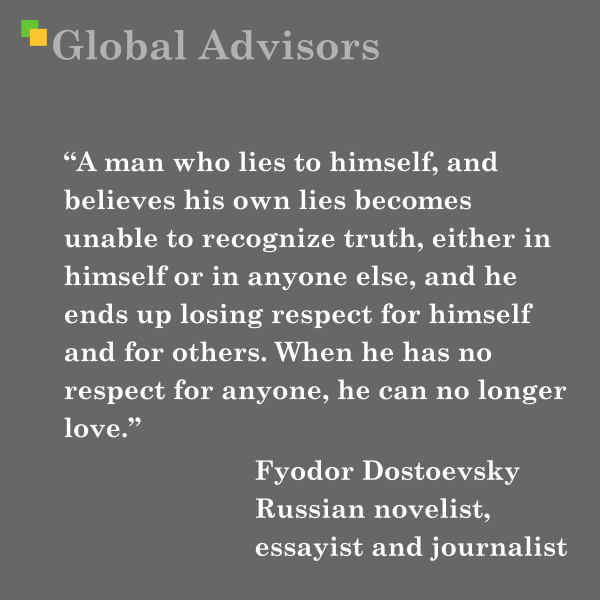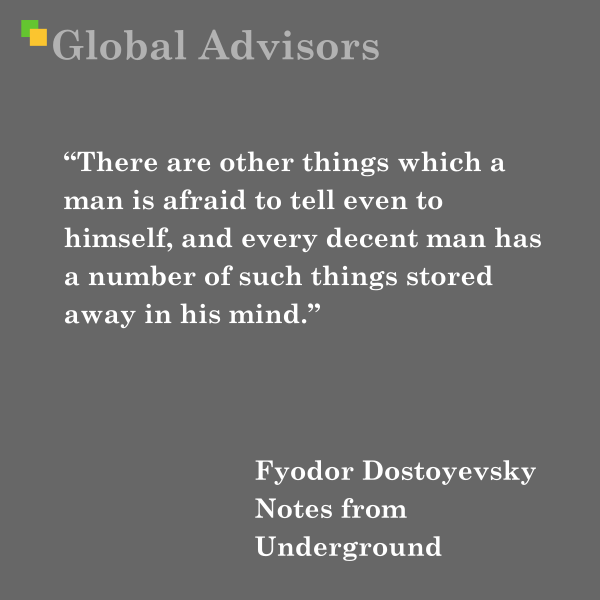“A man who lies to himself, and believes his own lies becomes unable to recognize truth, either in himself or in anyone else, and he ends up losing respect for himself and for others. When he has no respect for anyone, he can no longer love, and, in order to divert himself, having no love in him, he yields to his impulses, indulges in the lowest forms of pleasure, and behaves in the end like an animal. And it all comes from lying – lying to others and to yourself.” – Fyodor Dostoevsky – Russian novelist, essayist and journalist
Fyodor Mikhailovich Dostoevsky (November 11, 1821 – February 9, 1881) was a Russian novelist, essayist, and journalist who explored the depths of the human psyche with unflinching honesty. Born in Moscow to a family of modest means, Dostoevsky’s early life was marked by the emotional distance of his parents and an eventual tragedy when his father was murdered. He trained as a military engineer but pursued literature with relentless ambition, achieving early success with novels such as Poor Folk and The Double.
Dostoevsky’s life took a dramatic turn in 1849 when he was arrested for participating in a radical intellectual group. Sentenced to death, he faced a mock execution before his sentence was commuted to four years of hard labor in Siberia followed by military service. This harrowing experience, combined with his life among Russia’s poor, profoundly shaped his worldview and writing. His later years were marked by personal loss—the deaths of his first wife and his brother—and financial hardship, yet he produced some of literature’s greatest works during this time, including Crime and Punishment, The Idiot, Devils, and The Brothers Karamazov.
Dostoevsky’s writings are celebrated for their psychological insight and existential depth. He scrutinized themes of morality, free will, faith, and the consequences of self-deception—topics that continue to resonate in philosophy, theology, and modern psychology. His funeral drew thousands, reflecting his status as a national hero and one of Russia’s most influential thinkers.
Context of the Quote
The quoted passage is widely attributed to Dostoevsky, most notably appearing in The Brothers Karamazov, his final and perhaps most philosophically ambitious novel. The novel, published in serial form shortly before his death, wrestles with questions of faith, doubt, and the consequences of living a lie.
The quote is spoken by the Elder Zosima, a wise and compassionate monk in the novel. Zosima’s teachings in The Brothers Karamazov frequently address the dangers of self-deception and the importance of spiritual and moral honesty. In this passage, Dostoevsky is warning that lying to oneself is not merely a moral failing, but a fundamental corruption of perception and being. The progression—from dishonesty to self-deception, to the loss of respect for oneself and others, and ultimately to the decay of love and humanity—paints a stark picture of spiritual decline.
This theme is central to Dostoevsky’s work: characters who deceive themselves often spiral into psychological and moral crises. Dostoevsky saw truth—even when painful—as a prerequisite for authentic living. His novels repeatedly show how lies, whether to oneself or others, lead to alienation, suffering, and a loss of authentic connection.
Leading Theorists on Self-Deception
While Dostoevsky is renowned in literature for his treatment of self-deception, the theme has also been explored by philosophers, psychologists, and sociologists. Below is a brief overview of leading theorists and their contributions:
Philosophers
- Søren Kierkegaard (1813–1855): The Danish philosopher explored the idea of existential self-deception, particularly in The Sickness Unto Death, where he describes how humans avoid the despair of being true to themselves by living inauthentic lives, what he calls “despair in weakness.”
- Jean-Paul Sartre (1905–1980): In Being and Nothingness, Sartre popularized the concept of “bad faith” (mauvaise foi), the act of deceiving oneself to avoid the anxiety of freedom and responsibility. Sartre’s ideas are often seen as a philosophical counterpart to Dostoevsky’s literary explorations.
- Friedrich Nietzsche (1844–1900): Nietzsche’s concept of “resentment” and the “will to power” also touches on self-deception, particularly how individuals and societies construct false narratives to justify their weaknesses or desires.
Psychologists
- Sigmund Freud (1856–1939): Freud introduced the idea of defence mechanisms, such as denial and rationalization, as ways the psyche protects itself from uncomfortable truths—essentially systematizing the process of self-deception.
- Donald Winnicott (1896–1971): The psychoanalyst discussed the “false self,” a persona developed to comply with external demands, often leading to inner conflict and emotional distress.
- Erich Fromm (1900–1980): Fromm, like Dostoevsky, examined how modern society encourages escape from freedom and the development of “automaton conformity,” where individuals conform to avoid anxiety and uncertainty.
Modern Thinkers
- Dan Ariely (b. 1967): The behavioural economist has shown experimentally how dishonesty often begins with small, self-serving lies that gradually erode ethical boundaries.
- Robert Trivers (b. 1943): The evolutionary biologist proposed that self-deception evolved as a strategy to better deceive others, which ironically can make personal delusions more convincing.
Legacy and Insight
Dostoevsky’s insights into the dangers of self-deception remain remarkably relevant today. His work, together with that of philosophers and psychologists, invites reflection on the necessity of honesty—not just to others, but to oneself—for psychological health and authentic living. The consequences of failing this honesty, as Dostoevsky depicts, are not merely moral, but existential: they impact our ability to respect, love, and ultimately, to live fully human lives.
By placing this quote in context, we see not only the literary brilliance of Dostoevsky but also the enduring wisdom of his diagnosis of the human condition—a call to self-awareness that echoes through generations and disciplines.




